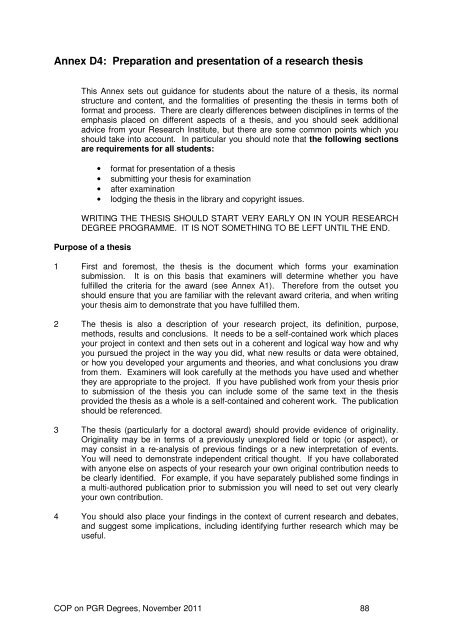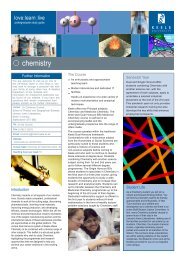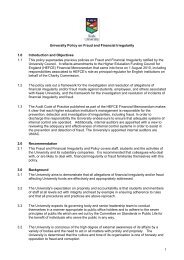keele university code of practice on postgraduate research degrees
keele university code of practice on postgraduate research degrees
keele university code of practice on postgraduate research degrees
You also want an ePaper? Increase the reach of your titles
YUMPU automatically turns print PDFs into web optimized ePapers that Google loves.
Annex D4: Preparati<strong>on</strong> and presentati<strong>on</strong> <str<strong>on</strong>g>of</str<strong>on</strong>g> a <strong>research</strong> thesis<br />
This Annex sets out guidance for students about the nature <str<strong>on</strong>g>of</str<strong>on</strong>g> a thesis, its normal<br />
structure and c<strong>on</strong>tent, and the formalities <str<strong>on</strong>g>of</str<strong>on</strong>g> presenting the thesis in terms both <str<strong>on</strong>g>of</str<strong>on</strong>g><br />
format and process. There are clearly differences between disciplines in terms <str<strong>on</strong>g>of</str<strong>on</strong>g> the<br />
emphasis placed <strong>on</strong> different aspects <str<strong>on</strong>g>of</str<strong>on</strong>g> a thesis, and you should seek additi<strong>on</strong>al<br />
advice from your Research Institute, but there are some comm<strong>on</strong> points which you<br />
should take into account. In particular you should note that the following secti<strong>on</strong>s<br />
are requirements for all students:<br />
• format for presentati<strong>on</strong> <str<strong>on</strong>g>of</str<strong>on</strong>g> a thesis<br />
• submitting your thesis for examinati<strong>on</strong><br />
• after examinati<strong>on</strong><br />
• lodging the thesis in the library and copyright issues.<br />
WRITING THE THESIS SHOULD START VERY EARLY ON IN YOUR RESEARCH<br />
DEGREE PROGRAMME. IT IS NOT SOMETHING TO BE LEFT UNTIL THE END.<br />
Purpose <str<strong>on</strong>g>of</str<strong>on</strong>g> a thesis<br />
1 First and foremost, the thesis is the document which forms your examinati<strong>on</strong><br />
submissi<strong>on</strong>. It is <strong>on</strong> this basis that examiners will determine whether you have<br />
fulfilled the criteria for the award (see Annex A1). Therefore from the outset you<br />
should ensure that you are familiar with the relevant award criteria, and when writing<br />
your thesis aim to dem<strong>on</strong>strate that you have fulfilled them.<br />
2 The thesis is also a descripti<strong>on</strong> <str<strong>on</strong>g>of</str<strong>on</strong>g> your <strong>research</strong> project, its definiti<strong>on</strong>, purpose,<br />
methods, results and c<strong>on</strong>clusi<strong>on</strong>s. It needs to be a self-c<strong>on</strong>tained work which places<br />
your project in c<strong>on</strong>text and then sets out in a coherent and logical way how and why<br />
you pursued the project in the way you did, what new results or data were obtained,<br />
or how you developed your arguments and theories, and what c<strong>on</strong>clusi<strong>on</strong>s you draw<br />
from them. Examiners will look carefully at the methods you have used and whether<br />
they are appropriate to the project. If you have published work from your thesis prior<br />
to submissi<strong>on</strong> <str<strong>on</strong>g>of</str<strong>on</strong>g> the thesis you can include some <str<strong>on</strong>g>of</str<strong>on</strong>g> the same text in the thesis<br />
provided the thesis as a whole is a self-c<strong>on</strong>tained and coherent work. The publicati<strong>on</strong><br />
should be referenced.<br />
3 The thesis (particularly for a doctoral award) should provide evidence <str<strong>on</strong>g>of</str<strong>on</strong>g> originality.<br />
Originality may be in terms <str<strong>on</strong>g>of</str<strong>on</strong>g> a previously unexplored field or topic (or aspect), or<br />
may c<strong>on</strong>sist in a re-analysis <str<strong>on</strong>g>of</str<strong>on</strong>g> previous findings or a new interpretati<strong>on</strong> <str<strong>on</strong>g>of</str<strong>on</strong>g> events.<br />
You will need to dem<strong>on</strong>strate independent critical thought. If you have collaborated<br />
with any<strong>on</strong>e else <strong>on</strong> aspects <str<strong>on</strong>g>of</str<strong>on</strong>g> your <strong>research</strong> your own original c<strong>on</strong>tributi<strong>on</strong> needs to<br />
be clearly identified. For example, if you have separately published some findings in<br />
a multi-authored publicati<strong>on</strong> prior to submissi<strong>on</strong> you will need to set out very clearly<br />
your own c<strong>on</strong>tributi<strong>on</strong>.<br />
4 You should also place your findings in the c<strong>on</strong>text <str<strong>on</strong>g>of</str<strong>on</strong>g> current <strong>research</strong> and debates,<br />
and suggest some implicati<strong>on</strong>s, including identifying further <strong>research</strong> which may be<br />
useful.<br />
COP <strong>on</strong> PGR Degrees, November 2011 88
















